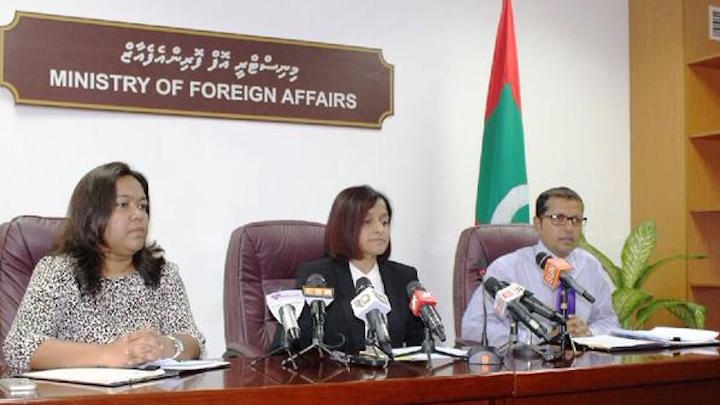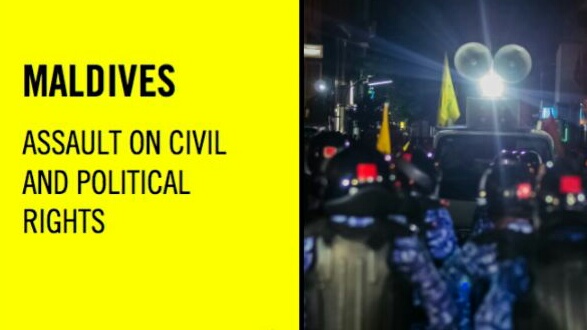The government has urged an Amnesty International delegation currently visiting the Maldives to conduct a “fair and objective assessment of the situation on the ground.”
The human rights organisation had released a briefing report titled ‘Assault on civil and political rights’ after a fact-finding mission in the Maldives from April 17 to 22.
The foreign ministry at the time accused Amnesty of tarnishing the Maldives’ image in collusion with the opposition and dismissed its observations of a “rapidly deteriorating” human rights situation as “preposterous fabrications with zero truth.”
At a press conference today, foreign minister Dunya Maumoon said the government was concerned with the Amnesty delegation’s decision in April to meet with only officials and supporters of the opposition party.
Dunya said the government had offered to arrange meetings with senior officials and to facilitate a visit to former President Mohamed Nasheed in prison at a latter date, “but they didn’t respect our word and came to the Maldives at a convenient time for them.”
Amnesty International’s Maldives researcher, Abbas Faiz, told Minivan News at the time the government was informed on April 2 of the visit planned for later in the month.
“The government suggested that we delay the visit until mid or end of May to better facilitate requested meetings with the authorities,” he said.
“Amnesty International informed the government in response that it will proceed with its visit in April as planned, that this visit will focus on meeting members of civil society, and that we are planning to have another meeting in May to meet government representatives as suggested by the authorities.”
The foreign ministry has since arranged meetings with high-level officials for the Amnesty International team in the Maldives from June 23 to 26.
“Constructive engagement”
Dunya said the government will cooperate with Amnesty International and address its concerns despite the organisation previously spreading “falsehoods” about the Maldives.
“The government reiterates the importance of constructive engagement to avoid one-sided reporting that would tarnish Maldives’ reputation without grounds and affect the stability, development and democratic progress made in the country,” the foreign ministry said in a statement today.
“Again, the government notes the biased and baseless allegations made by Amnesty International in the past.”
The Maldives is “still a young democracy”, it added, and stressed the government’s commitment to legislative and constitutional reforms.
“The government of Maldives expects international partners to recognise the progress made and values collaboration based on constructive engagement so long as any such work does not seek to create division within the Maldivian society,” the foreign ministry said.
Dunya said the human rights situation in the Maldives has been “improving steadily” and that the current administration has “enacted a total of 18 key human rights legislations within a period of less than 18 months, which is an unparalleled record in the history of the Maldives.”
In its briefing report, Amnesty had said that the government was cracking down on peaceful protests, stifling dissent, and “abusing the judicial system” to imprison opposition politicians.
In response, the foreign ministry accused Amnesty of seeking to “undermine and defame the Maldives judiciary and its national institutions.”
Abbas said Amnesty’s recommendations to the government were made “on the basis of solid evidence, as detailed in our press release and briefing.”
“We have highlighted the cases of individuals regardless of their party affiliation. We urge the authorities to address the violations documented in our reports, including the serious breaches of fair trial standards,” he said.
Amnesty had called the conviction of former President Nasheed on terrorism charges in March “a travesty of justice.” The 19-day trial was widely criticised by foreign governments and the UN over its apparent lack of due process.
In recent weeks, diplomatic pressure has been mounting on the Maldives to release “political prisoners.”
The European parliament in April adopted a resolution condemning the “serious irregularities” of Nasheed’s terrorism trial while US secretary of state John Kerry said during a visit to Sri Lanka that the opposition leader was “imprisoned without due process”.
“This is an injustice that needs to be addressed soon,” he said.
Earlier this month, US senators John McCain and Jack Reed urged their government to press for the release of all political prisoners in the Maldives.


